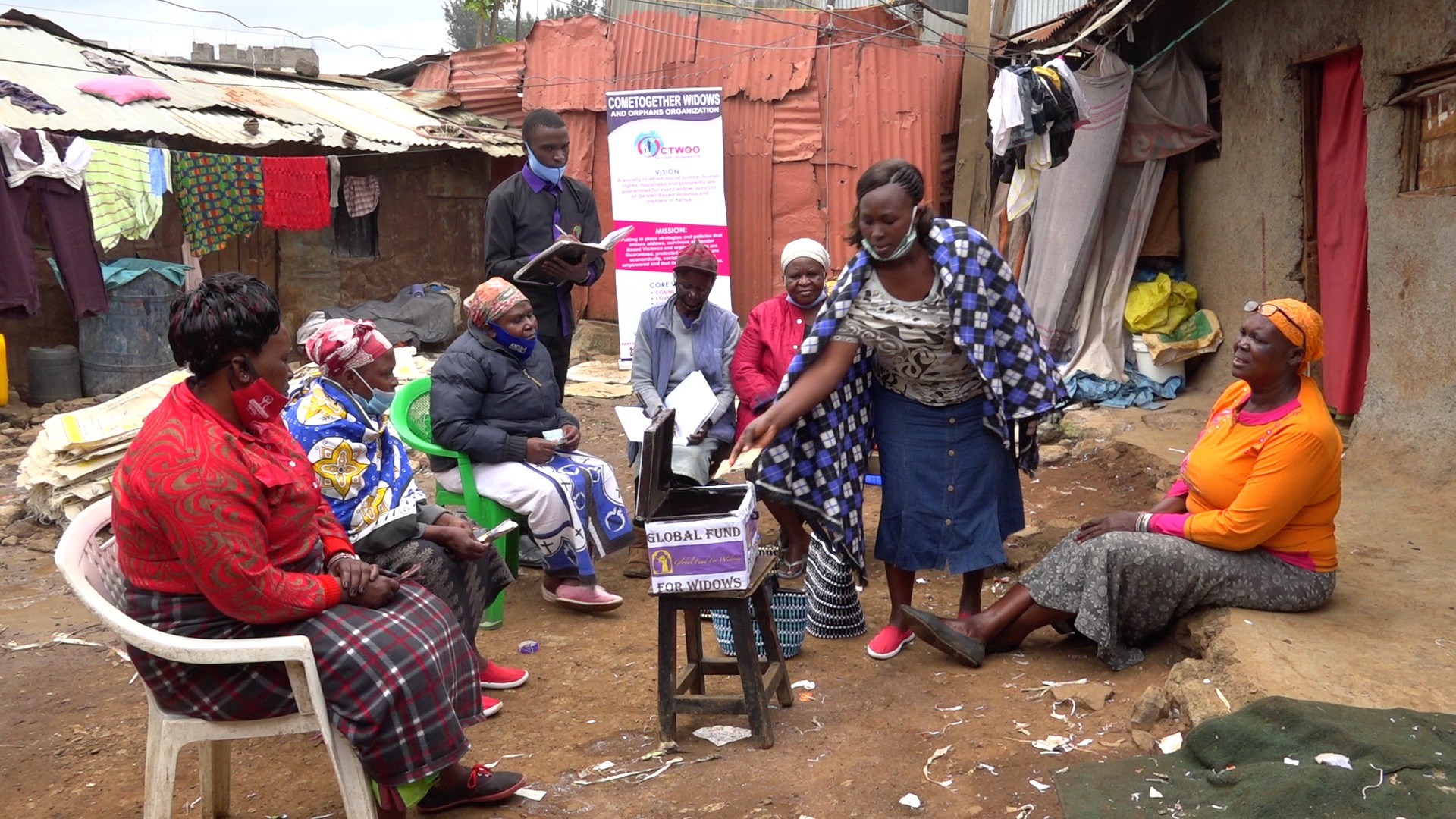
Mission
Global Fund for Widows (GFW) empowers widows and female heads of households to overcome poverty in developing countries through skills-based training, micro-finance, and the establishment of Widows’ Savings and Loan Associations (WISALA).
Life Challenges of the Women Served
Of the estimated 285 million widows in the developing world, more than 115 million live in abject poverty. Eighty-six million have suffered physical abuse.
While Kenya recently ratified gender equality legislation, women’s social and economic status continues to be defined by lack of information and traditional practices. The Constitution in the Bill of Rights guarantees equality of the sexes and freedom from discrimination. It protects women from harmful traditional practices (HTP), early marriages, widow cleansing, forced eviction, female genital mutilation, widow inheritance and dispossession of land. It allows ownership and protection of property by both sexes without discrimination. However, traditions, customs, and lack of knowledge regarding these laws prevents them being enforced. Unable to afford lawyers and ignored by authorities, women’s rights are routinely violated.
In Kenya, up to four million widows endure three forms of human rights violations: disinheritance, discrimination, and Harmful Traditional Practices.
Disinheritance: Given the high incidence of customary, traditional, or child marriages, many matrimonial unions are not commemorated with an official marriage certificate. Hence, upon death of the husband, a widow is not able to collect the death certificate because she lacks a marriage certificate. Most often, deeply distressed, in mourning, and caring for an average of five children, she is not even aware that she may need to collect a death certificate. What often happens is that her husband’s next of kin immediately begin the widow’s eviction and disinheritance.
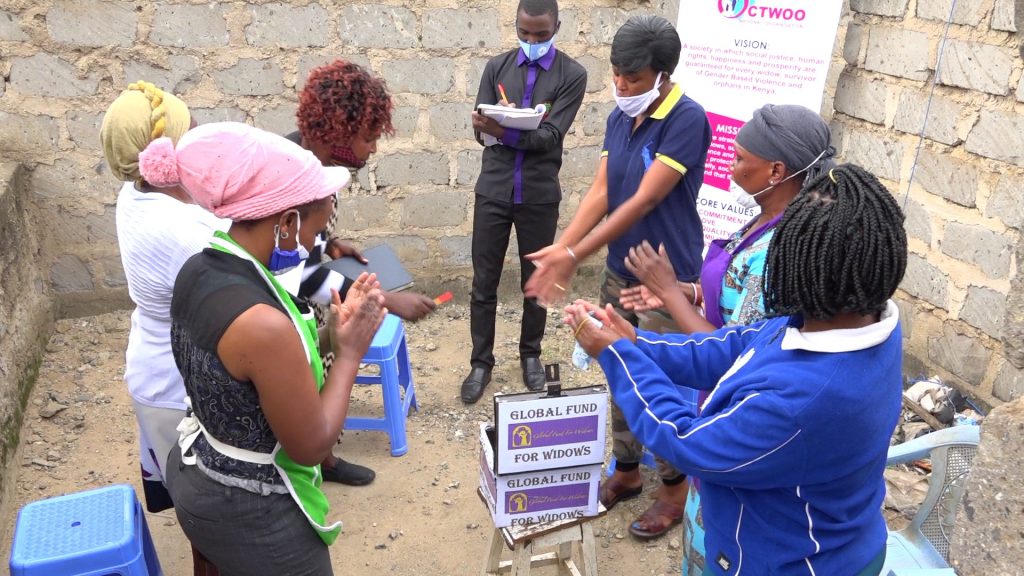 Discrimination: Legal, customary, and social practices preventing widows from access to land or valuable assets are common in Kenya. Widows claim that police, chiefs, local leaders, and even the courts fail to protect them, influenced instead by monetary incentives or patriarchal pressures. This institutionalized economic violence effectively prevents widows from accessing their rightful assets, accessing justice, or even accessing opportunity such as credit or dignified work.
Discrimination: Legal, customary, and social practices preventing widows from access to land or valuable assets are common in Kenya. Widows claim that police, chiefs, local leaders, and even the courts fail to protect them, influenced instead by monetary incentives or patriarchal pressures. This institutionalized economic violence effectively prevents widows from accessing their rightful assets, accessing justice, or even accessing opportunity such as credit or dignified work.
Harmful Traditional Practices (HTPs): Widows are blamed for their husband’s death as a way to further marginalize them. Widows endure violent and degrading HTPs including scarring, cutting, washing the husband and drinking the bath water rituals in order to be purged of their curse. Most HTPs include sexual violence and rape.
A form of HTP is the cleansing process. It forces the widow into having sex with either a male relative from her husband’s family, village leader, chiefs or a “professional cleanser,” often a paid sex worker, for whom the widow must pay for the ‘privilege’ of being raped or “cleansed.” The woman must be unprotected to consummate the cleansing, leaving her vulnerable to HIV and other STD’s. After having sex on the floor – sometimes outside of the house so that the entire community could witness the act – all garments and sheets used will be burnt. The man then shaves her head to show that she has now been “cleansed”. A chicken will then be slaughtered, cooked, and eaten together. The ceremony can last anywhere between three to seven days.
The Project
The Brookbank Project’s main goal is to improve the lives of widows by economically empowering them through access to capital via establishment of sustainable banks or WISALAs and certifying them as community paralegals armed with knowledge of their rights and entitlements.
The project will establish 14 WISALA banking groups. Widows will each invest $49.50 to purchase their initial WISALA bank shares. The Dining for Women grant will serve to match the widows’ investment in a 2:1 ratio, resulting in a large capital base from which widows may begin borrowing to establish their micro-enterprises. These businesses will enable widows to gain financial independence and a stable source of income.
The DFW grant will be used for two purposes:
- Establishing WISALAs for 350 widows in order to provide them with critical access to capital, enabling them to launch their own micro-enterprises, become economically empowered, gain self- sufficiency, and be leaders in their homes and
- Certify the same 350 widows as community paralegals, arming them with critical knowledge of their rights and entitlements and charging them with disseminating their knowledge to their community and engaging with local leaders.
Raising the socio-economic status of widows shifts community perception, allowing them to gain respect from leaders and become “women of means.” No longer needing to rely on others, they will be free from degradation and humiliation and gain respect from community (usually male) leaders. Widows’ daughters will be spared from child marriage. Their mothers will no longer seek that institution as “protection,” and instead will encourage their daughters to finish school, find dignified work and contribute further to society.
As certified community paralegals, widows will gain legal knowledge and be empowered to reject acts of violence, disinheritance and HTPs, and claim their rights and entitlements for themselves and others. They will also be positioned to advocate government and politicians for changes to structural discriminatory laws, and their implementation, as well as request improved social protections.
At the end of this project, GFW expects 350 widows to have:
- access to capital via the WISALA, increasing their wealth by over 200 percent.
- increased financial
- established or expanded sustainable micro-enterprises.
- decreased violence including economic violence and harmful traditional
- increased self-esteem.
- the capacity to better care for their
- the ability to afford school fees, allowing children to remain in
- improved household nutrition, health, and access to medical
- increased knowledge of rights and entitlements under Kenyan law and access to
- the ability to assist other women and widows as certified
- decreased/shifted discriminatory cultural
Impact:
Direct: 350; Indirect: 1,750 children of widows
UN Sustainable Development Goals
![]()
![]()
![]()
![]()
![]()
![]()
![]()
![]()
![]()
Questions for Discussion
- How does patriarchy perpetuate the violation of widow’s rights?
- How do you think this project model can address similar issues in other countries?
- Do you think it is possible to change perceptions that are based on cultural and traditional mores?
How the Grant Will be Used
DFW’s grant of $49,895 will be used for the following:
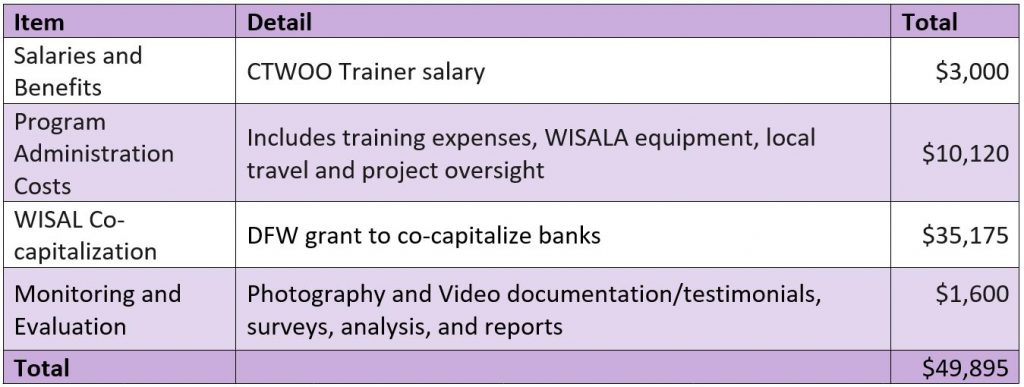
Why We Love This Project/Organization
We love that this project focuses on vulnerable poor widows in Kenya who are facing exploitation, disinheritance, and unstable futures. Kenya has ratified gender equality legislation, but widows continue to be impacted by lack of information and harmful traditional practices. By providing knowledge and legal, economic, and social support, Global Fund for Widows is working to get Kenya’s widows to claim their rightful place in Kenyan society.
Evidence of Success
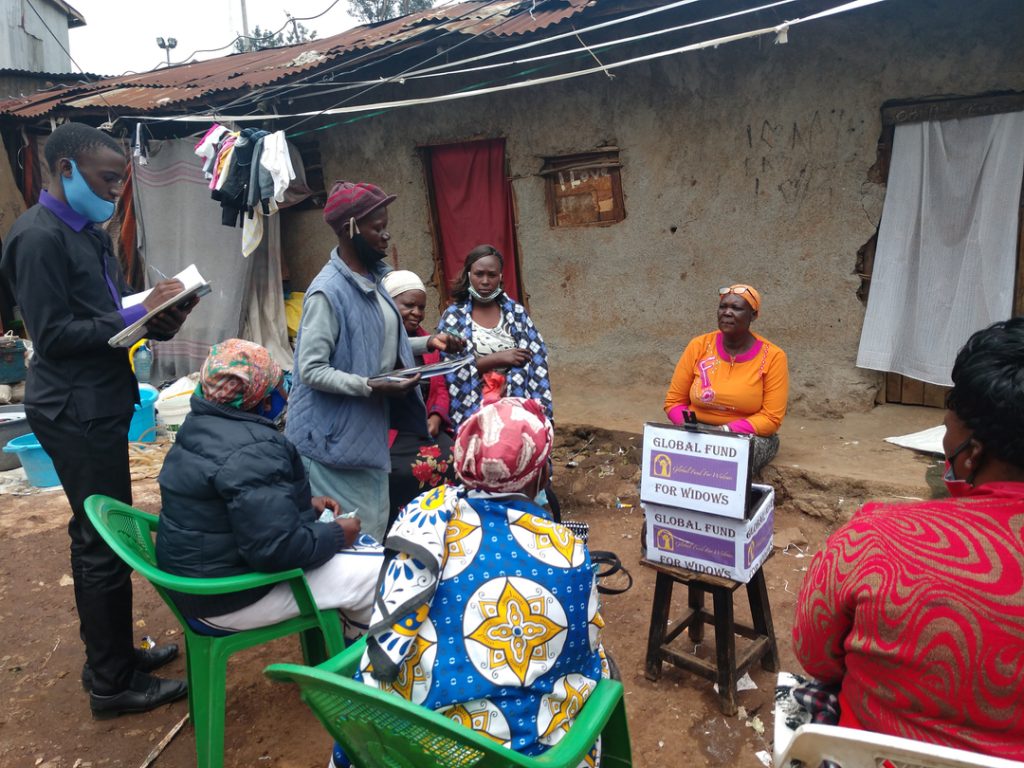 GFW’s successful empowerment interventions have demonstrated the following impact:
GFW’s successful empowerment interventions have demonstrated the following impact:
- Economically empowering 13,000 widows in eight countries who have in turn used their elevated status and voice to change discriminatory behaviors, inheritance laws, and criminalize acts of HTP.
- 78 percent of widows in GFW’s programs experienced increased income, 94 percent experienced increased social status, and 93 percent gained confidence to claim their legal
- Widows reported that as their income increased, their exposure to violence
- Launching 11 WISALAs in Tanzania, empowering 275 widows – Widows have been highly successful, gaining support of village leaders and local government. In fact, the male leadership of the Ngorongoro Pastoralist Council has pledged to establish 10 WISALAs for the widows if GFW agrees to establish one WISALA in the area. This is unprecedented acknowledgement and support for widows from male
- Launching 12 WISALAs in Kenya, empowering 300 widows, gaining support from Ministry of Gender, Parliament, media, and even President
Voices of the Girls
“My business has grown and in January 2020 I will not go to my friends to borrow school fees money. I have saved enough to pay my daughters tuition fees. Brookbank has helped me as a widow regain my dignity in the community. During training, I was enlightened about access to justice and this knowledge has helped me get a pro bono lawyer from FIDA, and now I have filed my succession case in court. I now know succession is my right.”
– Lucy, WISALA/Brookbank Project participant
“I am a widow from Kisii County who fled to Nairobi because I was disinherited of my property and my brother-in-law wanted to inherit me as a second wife. The journey has not been easy, but it became easier in 2019 when our founder of the NGO introduced us to Brookbank. I have paid tuition fees for my children with little struggle and my business is still in operation and I am able to repay my Brookbank (WISALA) loan in good time. My prayer is Brookbank will continue empowering us every year so that we grow from one level to another with the new widows joining our group.”
– Alice, WISALA/Brookbank Project participant
“Since I started Brookbank, my life has changed. I can afford daily bread and to send my children to school. I can even afford a smile!”
– WISALA/Brookbank Project participant
About the Organization
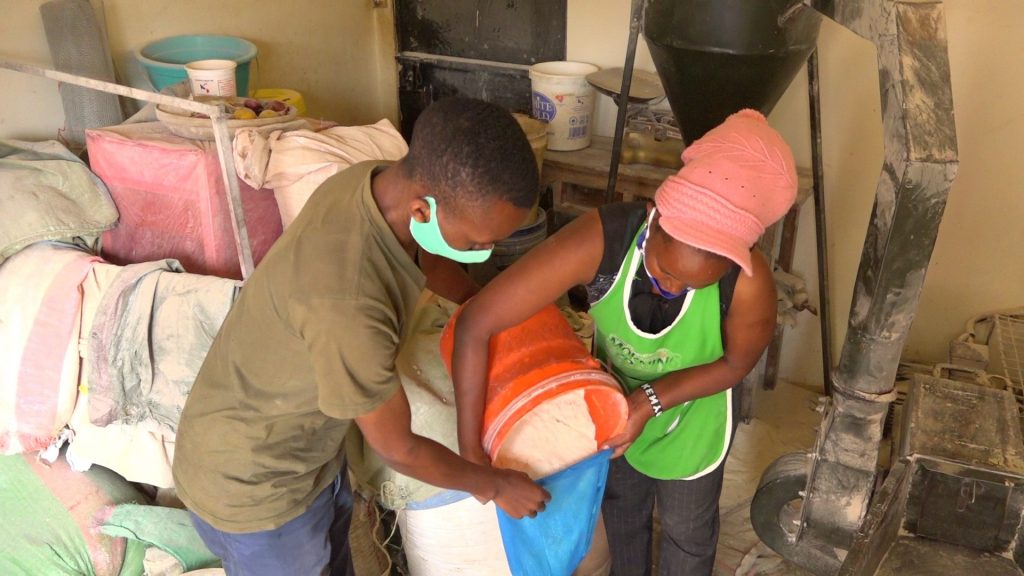 Heather Ibrahim-Leathers, Founder and President, established Global Fund for Widows (GFW) upon the passing of her grandmother in 2008. Her grandmother had been widowed in her mid-30s in Alexandria, Egypt, leaving her alone with four young children. As a result of her widowhood, she slipped into abject poverty, as her rights to inheritance were denied by her brothers-in-law. She was forced to make desperate decisions such as selecting only one of her children to educate. Ms. Ibrahim-Leathers realized that this single event of widowhood destroyed the family, and the generations that followed. Determined to break this vicious cycle of poverty, Ms. Ibrahim-Leathers, left her career on Wall Street as an alternative investments portfolio manager and established the Global Fund for Widows.
Heather Ibrahim-Leathers, Founder and President, established Global Fund for Widows (GFW) upon the passing of her grandmother in 2008. Her grandmother had been widowed in her mid-30s in Alexandria, Egypt, leaving her alone with four young children. As a result of her widowhood, she slipped into abject poverty, as her rights to inheritance were denied by her brothers-in-law. She was forced to make desperate decisions such as selecting only one of her children to educate. Ms. Ibrahim-Leathers realized that this single event of widowhood destroyed the family, and the generations that followed. Determined to break this vicious cycle of poverty, Ms. Ibrahim-Leathers, left her career on Wall Street as an alternative investments portfolio manager and established the Global Fund for Widows.
GFW serves widows in developing countries. These women have not only lost their husband, but also their home, ability to provide for their children, and their dignity. They are not familiar with their rights, and cultural, traditional, or religious barriers prevent them from accessing justice. The organization’s service areas are Egypt, Tanzania, Kenya, India, Nigeria, Malawi, Bolivia, and the Dominican Republic.
Where They Work
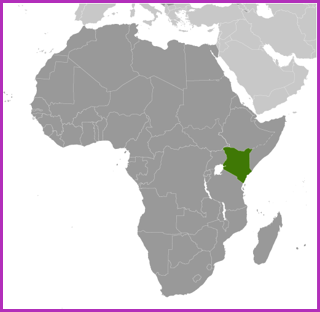
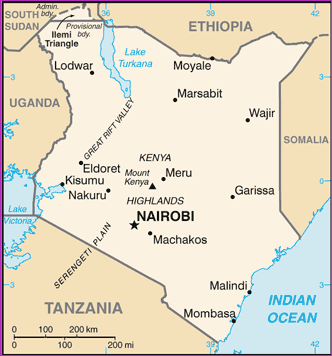
Kenya, where this project is located, has a population of 53,527,939 (June 2020 est.). It has experienced dramatic population growth since the mid-20th century as a result of its high birth rate and declining mortality rate. More than 40 percent of Kenyans are under the age of 15 due to sustained high fertility, early marriage and childbearing, and an unmet need for family planning. The population growth strains the labor market, social services, arable land, and natural resources. The birthrate is 27.2 births/1,000 population and the death rate is 5.2 deaths/1,000. The median age at first birth among women is 20.3 years.
In Kenya, men hold primary power, and predominate in roles of political leadership, moral authority, social privilege, and control of property. Closely linked to patriarchy, tradition and customs have evolved to justify disinheritance practices, and HTPs validate the violence perpetrated against widows.
A Closer Look at the Global Plight of Widows
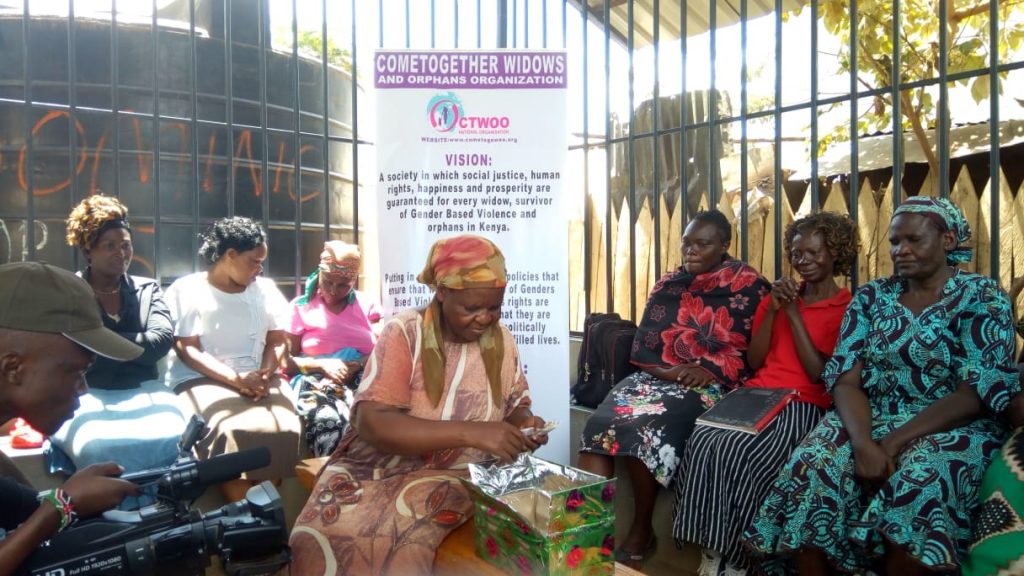 Widows comprise a significant proportion of all women, ranging from 7-16 percent of all adult women. In developed countries, widowhood is experienced primarily by elderly women, while in developing countries it also affects younger women, many of whom are still rearing children. Millions of the world’s widows of all ages endure extreme poverty, ostracism, violence, homelessness, ill health, and discrimination in law and custom. A lack of inheritance and land rights, widow abuse, and the practice of degrading and life-threatening mourning and burial rites such as widow cleansing, are prime examples of human rights violations.
Widows comprise a significant proportion of all women, ranging from 7-16 percent of all adult women. In developed countries, widowhood is experienced primarily by elderly women, while in developing countries it also affects younger women, many of whom are still rearing children. Millions of the world’s widows of all ages endure extreme poverty, ostracism, violence, homelessness, ill health, and discrimination in law and custom. A lack of inheritance and land rights, widow abuse, and the practice of degrading and life-threatening mourning and burial rites such as widow cleansing, are prime examples of human rights violations.
As an example, India has the largest recorded number of widows in the world – 33 million (10 percent of the female population) – and the number is growing because of HIV/AIDS and civil conflicts. Indian society, like all patriarchal societies, confers social status on a woman through a man; hence, in the absence of a man, she herself becomes a nonentity and suffers a social death. Sati (widow burning) was the ultimate manifestation of this belief.
In Afghanistan, the United Nations estimates that there are about two million war widows who are the sole providers for their families. Under the Taliban, widows have been doubly victimized. Denied paid employment, these widows further lost access to international food aid, since it was decreed by the Taliban that such aid had to be collected by a male relative, which these widows do not have. The Taliban ban on women working outside the home has drastically increased the numbers of widows and children begging in the streets.
In Bangladesh, allegedly a major center for trafficking young girls to the brothels of India, widows’ daughters who are without male protectors and not enrolled in school are especially at risk to this trade. The numbers of young Bangladeshi girls disappearing in this way is purportedly reaching astronomical proportions. Poor, homeless Bangladeshi widows make up a sizeable percentage of women marketed as domestic servants, forced to leave their children behind in the hope that the meager income that they send home will be used to feed, clothe, and educate them.
Widows across the globe share two common experiences: a loss of social status and reduced economic circumstances. The monetary value of widows’ pensions often does not keep up with fluctuations in the ever-changing cost-of-living indices, or with expectations that the older generation may have had of what life would be like in retirement. The relative poverty of older widows and young widowed mothers and their children due to the dismantling of welfare systems in the North and in Eastern Europe, while not comparable to the pauperization of widows in Asia and Africa, marginalizes them from mainstream society and increases their vulnerability to depression, poor health, and violence. Widowed mothers’ children can suffer malnutrition and poor health.
Source Materials
United Nations
CIA World Factbook
Global Fund for Widows
PRI
